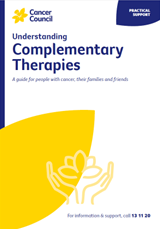- Home
- Cancer Information
- Living well
- Living well after cancer
- Managing side effects
- Complementary therapies
How complementary therapies can help
Complementary therapies
These therapies are widely used alongside conventional treatments. Examples include acupuncture, aromatherapy, massage, mindfulness meditation, relaxation, tai chi, art therapy and music therapy.
Many complementary therapies have been shown to be safe to use alongside conventional cancer treatments. Others are being scientifically tested.
Complementary therapies may help you manage side effects of treatment, increase your sense of control, decrease anxiety and improve your quality of life.
Let your doctor know about any complementary therapies you are using or thinking about trying. This includes over-the-counter medicines, herbal supplements and vitamins. Depending on the conventional medicines you are taking, some complementary therapies may cause reactions or unwanted side effects.
Your doctor may be able to refer you to a qualified therapist who is experienced in working with cancer survivors and understands the role of complementary therapies in cancer care.
Make sure to tell the complementary therapist about your cancer diagnosis and treatment. Some therapies may need to be adjusted to avoid interactions with your conventional medicines or treatments.
Alternative therapies
These therapies are different from complementary therapies. They are used instead of conventional treatments.
Many alternative therapies have not been scientifically tested, so there is no proof they stop cancer growing or spreading. Others have been tested and shown not to be effective.
While side effects of alternative treatments are not always known, some are serious. Cancer Council does not recommend the use of alternative therapies. Visit cancer.org.au/iheard to get the facts.
See Complementary therapies for information about how different complementary therapies can help.
Podcast: Meditation and Relaxation
Listen now
More resources
Prof Michael Jefford, Medical Oncologist and Director, Australian Cancer Survivorship Centre, Peter MacCallum Cancer Centre, VIC; Lucy Bailey, Nurse Counsellor, Cancer Council Queensland; Philip Bullas, Consumer; Dr Kate Gunn, Clinical Psychologist and Senior Research Fellow, Department of Rural Health, University of South Australia, SA; Rosemerry Hodgkin, 13 11 20 Consultant, Cancer Council WA; Prof David Joske, Clinical Haematologist, Sir Charles Gairdner Hospital and Clinical Professor of Medicine, The University of Western Australia, WA; Kim Kerin-Ayres, Clinical Nurse Consultant, Cancer Survivorship, Concord Hospital, NSW; Sally Littlewood, Physiotherapist, Seymour Health, VIC; Georgina Lohse, Social Worker, GV Health,VIC; Melanie Moore, Exercise Physiologist and Clinical Supervisor, University of Canberra Cancer Wellness Clinic, ACT; June Savva, Senior Clinician Dietitian, Nutrition and Dietetics, Monash Cancer Centre, Monash Health, VIC; Dr Elysia Thornton-Benko, Specialist General Practitioner and Research Fellow, University of New South Wales, NSW; Prof Janette Vardy, Medical Oncologist, Concord Cancer Centre and Professor of Cancer Medicine, The University of Sydney, NSW; Lyndell Wills, Consumer.
View the Cancer Council NSW editorial policy.
View all publications or call 13 11 20 for free printed copies.
Need to talk?
Support services
Life after cancer treatment
Programs and support for people who have finished treatment
Cancer Council Online Community
A community forum – a safe place to share stories, get tips and connect with people who understand
Cancer information
Emotions and cancer
Learn about the different emotions you may experience after a cancer diagnosis
Staying healthy after treatment
Lifestyle changes that can help keep you in good health

